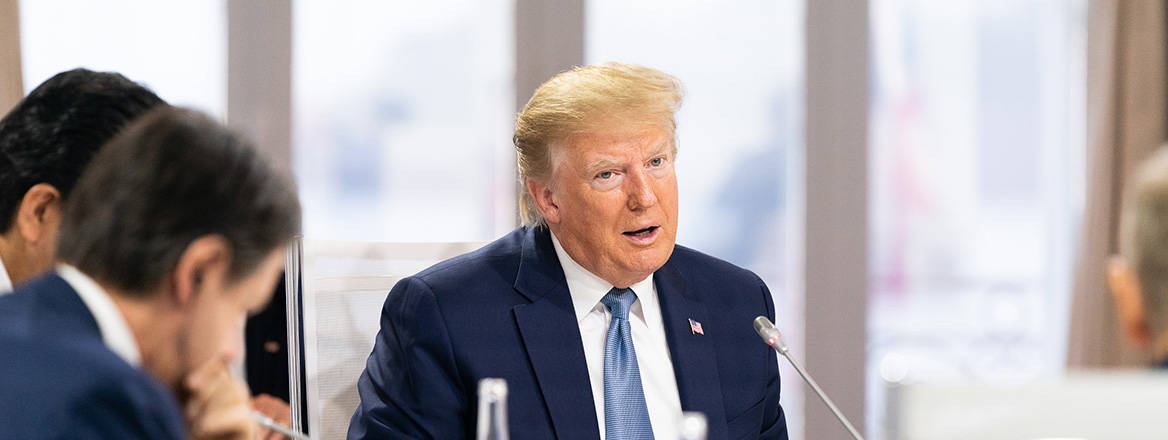RUSI
|
|
Working with Trump? Not so Fast
World leaders’ responses to Trump’s return reflect an effort to flatter his self-image, yet differences from his previous administration are likely to make cooperation this time around much more challenging.

‘Germany and America are connected by values of democracy, freedom and respect for the law and the dignity of man, independent of origin, skin colour, religion, gender, sexual orientation or political views’, stated then Chancellor Angela Merkel to president-elect Donald Trump in 2016: ‘I offer the next President of the United States close cooperation on the basis of these values’. The patronising message told Trump how a US president should conduct himself, both at home and abroad. Others then and since have been similarly patronising, if not scornful. Remarkably, others – such as the late Japanese Prime Minister Shinzo Abe – quickly learnt that flattery and pomp went a long way in pacifying Trump, even if this did not necessarily mean getting what they wanted.
The tone of world leaders has been markedly different this time around after Trump’s shocking political comeback. Embattled President Volodymyr Zelensky of Ukraine – perhaps the country that has the most to fear from Trump’s return – wrote that he was looking forward to the president-elect’s ‘decisive leadership.’ NATO Secretary General Mark Rutte restated the importance of ‘working together’ on the many challenges facing the Alliance. A similar message came from European Commission President Ursula von der Leyen. UK Prime Minister Keir Starmer wrote that he was looking forward to ‘working with’ Trump in the years ahead. Working together was also at the centre of the messages coming from Paris and Berlin. In other words, two main themes emerged: Trump’s leadership and decision-making, and a renewed opportunity to work together.
Certainly, world leaders understand the importance of flattering the incoming president and strengthening his (self-) image as a decisive leader. But will it be any easier than last time to actually ‘work’ with Trump? It seems that after the shocking results of the elections, a hefty dose of wishful thinking surrounding Trump is characterising the reactions of many leaders, think tanks, and commentators. Much has changed domestically and internationally since last time Trump was elected, but early signs, the president-elect’s recent demeanour, and the people surrounding him should ring alarm bells in many capitals around the world.
Trump 1.0: The Madman Theory and the ‘Adults in the Room’
In his first presidency, Trump’s decision-making was often characterised by bluster, as evidenced by aggressive and unpredictable presidential statements with little connection with any underlying policy process. Many of these statements were certainly escalatory, including frequent off-the-cuff tweets. Famously, some of his tweets pushed the US to the brink of confrontation with North Korea. As Dan Drezner put it, ‘his lack of impulse control, short attention span and frequent temper tantrums’ often undermined his administration’s policies and processes. This often left US officials – be it in the White House, the Pentagon or the State Department – struggling to explain and make sense of the president’s outbursts and working to manage or moderate their consequences. This was even more the case when Trump’s words contradicted his own administration’s policies and posture.
The campaign has shown a lack of improvement when it comes to Trump’s attention to – and ability to articulate – a policy vision or posture, be it foreign or domestic
The not so subtle rhetoric used at the time to describe this process was that of the ‘adults in the room’. These were members of Trump’s cabinet – somewhat more aligned with Washington’s establishment – who were able to moderate the effects of the president’s worst instincts. In a famous, anonymous New York Times story, this expanded to the idea of an internal ‘resistance’ within the administration that prevented the country – and US world leadership – from falling off a cliff.
This interpretation certainly had some merits. On many occasions, some of the adults in the room were able to contain the president’s worst instincts. Secretary of Defence James Mattis, for example, completely ignored Trump’s angry request to go after Bashar al-Assad of Syria after the latter had conducted a chemical weapons attack on his own people. On another occasion, then National Security Advisor John Kelly seemingly tried to dissuade Trump from using nuclear weapons against North Korea. The advice of military officials that Kelly brought to the Oval Office did not work, and Trump had no awareness of the need to notify Congress in case of a pre-emptive strike. What worked, allegedly, was playing on Trump’s narcissism and his ability as a ‘salesman’ to strike a deal with North Korea.
And yet, other aspects of the ‘adult in the room’ rhetoric were misguided if not counterproductive. First, while they might have exercised some influence, the ‘adults’ were unable to change the manner in which the administration made decisions or to reshape the president’s approach to the role. As David Sanger makes clear in his latest book on the Trump and Biden years, a clear feature of the 45th (and now 47th) president is his unwillingness, if not inability, to pay attention, to follow process and to learn. By the end of the administration most of the adults had left the room anyway, with the dire consequences seen in Trump’s violent last days in office. Second, the rhetoric of the adults in the room was seen – and exploited – by Trump loyalists as a confirmation that a ‘deep state’ was preventing the president from pursuing his agenda. As Doug Hoelscher and Michael Rigas – chair and vice-chair of the America First Policy Institute, who are working on the presidential transition – recently wrote, Trump’s ‘policies were aggressively resisted by an entrenched national security bureaucracy, sometimes called the “deep state”’. So, will Trump be any easier to work with this time around? Several signs point to the need for caution, especially from European leaders.
Out with the Adults and in with the Ideologues: Trump 2.0
For one thing, the ‘adults’ – or at least those that worked in the first Trump administration – won’t be in the room this time around. While it is still early days for presidential appointments, the first signs point to Trump ‘learning the lesson’ of his last administration and picking from his inner circle. Absolute political loyalty seems to be the main entry requirement. The selection of Susie Wiles, his political strategist, as Chief of Staff points in this direction. In a tweet, Trump also dismissed any role for former US Ambassador to the UN and presidential candidate Nikki Haley, likely perceived as too late in ‘bending the knee’, and for Mike Pompeo, who was perhaps seen as too politically ambitious and too detached from Trump’s inner circle.
If anything, Trump’s current allies, such as the America First Policy Institute and the Heritage Foundation – the conservative think tank behind Project 2025 – are cherishing the opportunity to remake US foreign policy in their own, and Trump’s, image. There is always, of course, a discrepancy between pre-election plans and presidential foreign policy. But process as well as outcome might be affected. In his agenda, like that of Project 2025, Trump has promised to purge the civil service and State Department and use executive orders to remove ‘rogue bureaucrats.’ Other areas – such as the intelligence community and the Pentagon – might fare better or see less radical changes, but they might not fare as well as they did in 2016.
World leaders should prepare for a US government that is less stable, less predictable and – most likely – less amenable to diplomacy and compromise
This process of gutting might well deprive those same leaders now hoping to work with Trump of suitable interlocutors – mid-career level officials working on the ‘day-to-day’ management of diplomacy. If selected from an ‘America First’ pool, furthermore, these interlocutors might not be amenable to following established norms and diplomatic practices Europeans and others might expect. The fact that Elon Musk took part in Trump’s first post-election call with Zelensky confirms this. Furthermore, compared to 2016, Republicans will control the Senate and the House, and will retain a strong majority in the Supreme Court. Checks and balances will be harder to maintain.
The final, but perhaps most important, word of caution comes from the president himself. The Trump seen on the campaign trail is one whose style and instincts have not changed. The campaign has shown a lack of improvement when it comes to Trump’s attention to – and ability to articulate – a policy vision or posture, be it foreign or domestic. If anything, most of his foreign policy pronouncements have been vague and – in a repeat of 2016 – have built on his supposed abilities as a dealmaker. Again, following the 2016 precedent, Trump has tended to be very critical of those same European leaders that have rushed to congratulate him, and very complimentary towards the world’s dictators. Efforts to make him answer foreign policy questions with any precision during the presidential debate with Vice-President Kamala Harris also faltered. His age, his seeming cognitive decline, and his likely vindictiveness against real (or perceived) slights only worsen a precarious situation.
Many commentators have already discussed what a new Trump presidency will look like for various parts of the world. Any predictions this early in the process always contain an element of speculation, but one thing is certain: regardless of the current wishful thinking, Trump won’t be any easier to work with this time around – if anything, it will be worse. World leaders should prepare for a US government that is less stable, less predictable and – most likely – less amenable to diplomacy and compromise.
© Luca Trenta, 2024, published by RUSI with permission of the author
The views expressed in this Commentary are the author’s, and do not represent those of RUSI or any other institution.
For terms of use, see Website Ts&Cs of Use.
Have an idea for a Commentary you’d like to write for us? Send a short pitch to commentaries@rusi.org and we’ll get back to you if it fits into our research interests. Full guidelines for contributors can be found here.
Original article link: https://rusi.org/explore-our-research/publications/commentary/working-trump-not-so-fast


